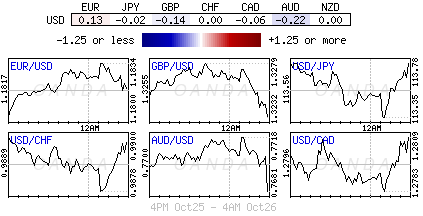Thursday October 26: Five things the markets are talking about
What to Expect from the ECB
The EUR is expected to be better bid on any signal that the European Central Bank (ECB) is likely to cut asset purchases ‘further and faster’ than the market expects.
Nevertheless, the chance of a ‘hawkish’ surprise are low given the market now fully expects the ECB to announce plans to reduce bond purchases at today’s meeting.
The speed of the reduction should depend on the development of economic growth, the inflation rate and inflation expectations. The current €60B per month program ends in December, but most expect a reduction of purchases to last at least six months and perhaps longer.
With forward guidance ruling out any rate hike any time soon, the focus is going to be on the extent to which QE asset purchases will be tapered and the deadline.
There are a number of possible outcomes.
1. A sizeable reduction in asset purchases from the current €60B p.m. to perhaps €20B p.m. over an extended period of time.
2. Or a smaller reduction to perhaps €40B p.m. over a shortened period.
Either option would increase QE, however, the ECB would probably view option one, slower taper, the preferred choice as preferable because of sluggish inflation.
1. Stocks mixed results
In Japan, the Nikkei share average edged up overnight, lifted by shares backed by strong earnings. The Nikkei ended +0.2% higher, while the broader Topix rallied +0.1%.
In Hong Kong, equities tracked Wall Street lower ahead of today’s ECB meeting. Both the Hang Seng index and the China Enterprises Index lost -0.4% respectively.
Note: China’s Communist Party’s Congress, which concluded on Tuesday, has offered investors few surprises in terms of economic policies.
In China, blue-chip indexes powered to a fresh 28-month high overnight, supported by stellar earnings reports and as investors expect Beijing to push forward ‘Belt and Road’ projects. The blue-chip CSI300 index rose +0.4%, while the Shanghai Composite Index added +0.3%.
In Europe, regional indices trade mostly higher ahead of the ECB rate meeting. Mixed earnings have capped the DAX’s move – Germanys Bayer is down -3%, while the U.K Barclays bank is impeding FTSE progress.
U.S stocks are set to open in the red (-0.1%).
Indices: Stoxx600 flat at 387.20, FTSE +0.3% at 7465, DAX +0.1% at 12973, CAC-40 +0.2% at 5385, IBEX-35 -0.2% at 10137, FTSE MIB +0.1% at 22476, SMI +0.4% at 9117, S&P 500 Futures -0.1%
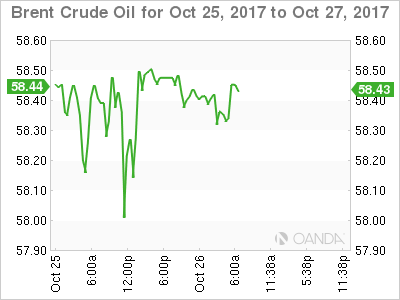
2. Oil prices inch lower on increases in U.S crude inventories, gold higher
Oil prices are a tad lower overnight, pressured by an unexpected increase in U.S crude inventories and as oil output and exports from the U.S rose last week.
Brent crude for December delivery is down -8c at +$58.36 a barrel, while U.S West Texas Intermediate (WTI) crude is down -14c at +$52.04.
EIA data yesterday showed that U.S crude inventories rose by +856k barrels last week. The market had expected a drawdown of -2.6m barrels.
Also providing pressure is the increase in U.S production. Data this week showed that there is a +1.1m bpd rebound in U.S crude production to +9.5m bpd after the falloff due to Hurricane Nate.
Ahead of the U.S open, gold prices are a tad better bid amid a weaker U.S dollar, with the market expecting the ECB to taper monetary stimulus later this morning. Spot gold is up +0.3% at +$1,280.42 an ounce.
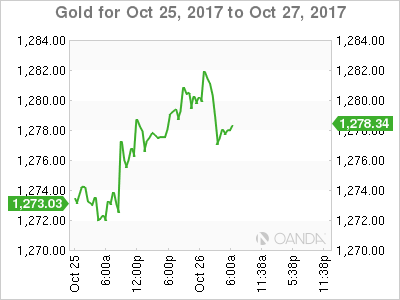
3. Sovereign yields back up
U.S bonds yield continue to edge higher as investors anticipate tighter monetary policies. The yield on the U.S 10-year note has backed up above +2.44%, the highest yield in seven-months, and any signs from the ECB this morning that they will be reducing QE should support higher Euro debt yields. Germany’s 10-year Bund yield advanced less than +1 bps to +0.48%, the highest in three months.
The market is also pricing in a good chance that President Trump could nominate a replacement for Ms. Yellen who would quicken the pace of interest-rate increases.
Earlier this morning, Sweden’s Riksbank left their repo rate unchanged at -0.50% as expected. The central bank will maintain its Repo Rate path and current QE bond-buying program, as monetary policy is needed to remain ‘expansionary’ for inflation to continue to be close to +2% target.
Norway’s central bank (Norges) has also left its deposit rate unchanged (+0.5%), as expected. The decision was unanimous and the balance of risks unchanged from last meeting (Sept). Improvement in the labor market appears to be continuing and the SEK currency remains weaker than projected.
Note: Turkey’s central bank holds its MPC meeting at 06:00 EDT, where all policy rates are expected to be left unchanged.
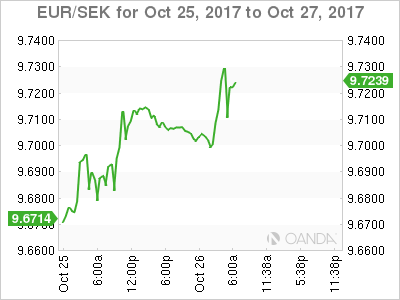
4. Dollar takes a back seat ahead of ECB
The EUR (€1.1807) has backed off from its six-day high (€1.1838) set earlier this morning, as investors await the ECB announcement at 07:45 EDT, followed by ECB President Draghi’s press conference at 08:30 EDT. The ECB is expected to deliver their plans to scale back monetary easing. The impact on the ‘single’ unit is expected to be limited, unless the ECB hints at the expected timing of interest rates rising, which is not expected. On the other hand, surprisingly cautious comments by Draghi could see the EUR retrace most of yesterday’s gains.
The CAD (C$1.2800) has fallen to a ten-week low outright after the Bank of Canada took a ‘cautious’ approach on future rate decisions, despite keeping the +1% rate on hold. Governor Poloz yesterday said that the loonie’s strength has delayed the prospect of CPI rising to +2% until H2 of 2018. The BoC expects growth to average around +3.5% between 2017 and 2019, but added ‘this outlook remains subject to substantial uncertainty about geopolitical developments and fiscal and trade policies.’
With Fed Dec rate hike odds just below +100%, monetary policy divergence should continue to support USD/CAD.
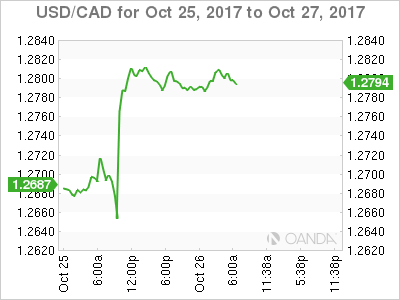
5. German consumers upbeat on economy, but fret over inflation
GfK’s monthly survey this morning indicates that German consumer sentiment will weaken in November – it gives a reading of 10.7 points for the coming month, compared with 10.8 points in October.
Digging deeper, the German consumer expects that the domestic economy will continue to grow, which in turn gives them safety in jobs and planning. However, Germans remain wary of inflation as the most recent data from September showed the headline rate at +1.8%.
